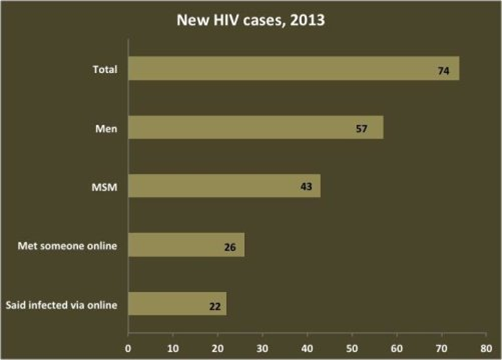HIV in Rhode Island: Newly diagnosed men often ‘hooked up’ online

Of the 74 new HIV cases in Rhode Island in 2013, three in 10 occurred among men who told researchers they believed they were infected by a man met online.
Credit: Brown University
More than 60 percent of Rhode Island men who have sex with men (MSM) diagnosed with HIV in 2013 reported meeting sexual partners online in the preceding year, according to a study published in the journal Public Health Reports.
Study authors at Brown University, The Miriam Hospital, and the Rhode Island Department of Health said companies that produce hookup websites and apps should partner with public health groups, to share public health messages about the risks of sexual encounters arranged online. For instance, sites and apps could provide affordable advertising access to help prevent infection in communities that are most impacted by HIV.
In 2013, 74 Ocean State residents were newly diagnosed with HIV. Three in five were gay, bisexual, or other MSM, and of those 43 people, 22 told researchers they believe a man they met online gave them the virus, according to the study published online in the journal Public Health Reports. The research team interviewed 70 of the state’s 74 newly diagnosed people for the study.
“This is a statewide study that included nearly all individuals newly diagnosed with HIV across an entire state,” said Amy Nunn, associate professor of Public Health and Medicine at Brown University and director of the Rhode Island Public Health Institute. “This is one of the first studies to document how common Internet site use is among people newly diagnosed with HIV and highlights important opportunities to partner with hookup sites to advance public health.”
Five sites and apps, some of which are also used by women, were the most popular: Grindr, Manhunt, Scruff, Adam4Adam and Craigslist. Study lead author Dr. Philip Chan, assistant professor of medicine in the Alpert Medical School and director of at the STD Clinic at The Miriam Hospital, said the widely used sites are part of the lifestyle and culture among many gay and bisexual men and can lead to lasting relationships, not just health risks. The goal of the research, therefore, is not to stigmatize sex or men who use the sites, he and Nunn said, but to instead to inspire partnerships with companies to include more information that could slow the spread of HIV.
“Prevention messaging is a vital tool in our work to prevent new HIV transmissions in Rhode Island,” said study co-author Dr. Nicole Alexander-Scott, director of the Rhode Island Department of Health. “A study like this is an urgent call to action for greater collaboration around education to address the health needs of men who have sex with men. The rate of new HIV diagnoses among men who have sex with men represents an unacceptable health disparity that absolutely must be addressed.”
Seeking public health partnership
“Across the U.S. we are seeing MSM as the number one risk group for HIV infection,” Chan added. “On these online hookup sites, many young MSM are meeting sex partners. It’s really an under recognized and under utilized approach we should be using to reach out to and engage this group.”
To date, public health officials have struggled to sustain informational campaigns on sites and apps that charge for advertising, either because they have no discounts for non-profits or don’t discount enough, Chan said. Craigslist and Scruff ads are free, the authors said, but staff at small non-profit or government agencies face logistical challenges in messaging in these venues, such as having to continually repost ads.
“One of the challenges this study highlights is that it’s prohibitively expensive for many organizations who focus on public health promotion to buy ads on these apps and websites,” Nunn said. “Reducing disease transmission should be part of these organizations’ corporate social responsibility programs.”
The researchers document recent advertising costs in their study, which can quickly run into the thousands of dollars.
“We would like to see more of these companies stepping up to the plate to work with public health departments,” Chan said.
The urgency has not abated since 2013, Chan said. In 2014, the study notes, HIV infections in Rhode Island grew by 97 new diagnoses, again mostly among MSM.
Many of the individuals newly diagnosed in Rhode Island were diagnosed late in the course of their infection, the study showed. Nunn said this suggests that they may have been living HIV for a long time, and potentially unknowingly transmitting HIV to other people, including partners they met online. These findings highlight opportunities to disrupt HIV transmission, she said, by partnering with websites to deliver prevention messaging services that promote routine HIV testing, treatment, and uptake of pre-exposure prophylaxis (PrEP), a once a day pill that can dramatically reduce HIV acquisition risks for HIV negative individuals.
0 Comments